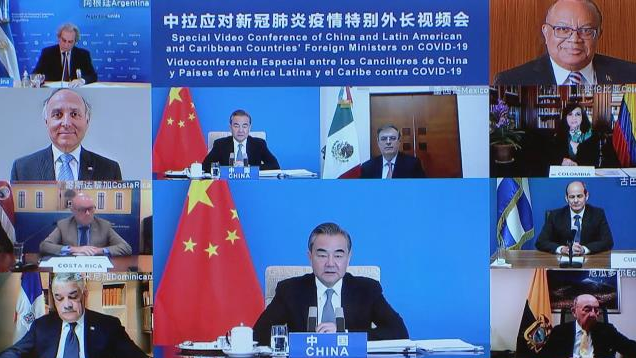
Foreign ministers from China, Latin American and Caribbean countries meet via video conference on COVID-19, July 23, 2020. /Xinhua via China's Ministry of Foreign Affairs
Foreign ministers from China, Latin American and Caribbean countries meet via video conference on COVID-19, July 23, 2020. /Xinhua via China's Ministry of Foreign Affairs
Editor's note: Sergio Villarroel is a lawyer and a Master's degree student in international relations and diplomacy at Shanghai University. The article reflects the author's opinions, and not necessarily the views of CGTN.
More than seven months have passed since the start of the COVID-19 pandemic, and what at first seemed to be as a distant and ephemeral situation for Latin American countries has proven over the months to be one of the worst social and economic crises faced by the region throughout its entire recent history.
Factors such as almost complete lack of capacity of national health systems to cope with the increasing number of infections, the general lack of reserve funds necessary to prevent the collapse of their economies in the face of a prolonged cessation of production, the denialism of some important political leaders about the gravity of the situation, and some old acquaintances of the region such as alarming levels of corruption and paralyzing internal political instability have been the ingredients of a catastrophic situation against which the received foreign aid has become vital for coping with the crisis.
Regarding this last point, the assistance provided by China deserves special attention, which is in clear contrast with the isolationist attitude and the unwillingness of the U.S. to assume a much-needed regional leadership. It has allowed the Asian giant to shore up its influence in Latin America, maintaining a much more pragmatic cooperation attitude than other developed nations and offering one of the few truly global proposals to face the pandemic.
Argentinian historian and sinologist Francisco Taiana told Xinhua in an interview,"China, to the extent that was able to contain the outbreak within its territory, has demonstrated a practical attitude towards the Latin American and Caribbean region, an attitude that is distinguished from the one of several countries in the world that we see competing each other to secure medical supplies."
In what international media termed the "mask diplomacy," Chinese aid has so far reached 30 countries in the region in the form of hundreds of millions of dollars in financial loans, medical equipment, technical assistance and promises of financing to acquire and produce the vaccine once it is released on the market. It has succeeded in overcoming the traditional reluctance of some politicians and some important sectors of the Latin American population to have a greater presence of developed countries in the region, which comes from the still open wounds left by centuries of colonialism and interventionism.

Children play at a square in Buenos Aires, Argentina, July 12, 2020. /Xinhua
Children play at a square in Buenos Aires, Argentina, July 12, 2020. /Xinhua
In this context, a debate has started among important political and social sectors of the region. Fueled by conflict of interests generated by the cooperation (and the increasingly leading role) of China, this debate has become quite interesting. This debate is laced with anti-China rhetoric – blaming the country for uncontrolled spread of the virus and accusing it of disguising neo-colonial objectives as selfless healthcare and financial assistance.
However, this has not been a general trend, although certain politicians like Brazilian President Jair Bolsonaro have been trying to externalize their own lack of willingness to implement effective measures against COVID-19, potentially shedding the political burden of thousands of perfectly preventable deaths.
Most leaders in the region have recognized that beyond ideological differences, China's aid has been extremely valuable. Meanwhile, the Chinese government, beyond its altruistic desires, has also stated in a very pragmatic way that Latin America is its very important commercial and political ally, and consequently its rapid recovery benefits both sides. This heralds a new stage of diplomatic ties between China and Latin America, one that is marked by the joint desire to overcome the pandemic and establish prevention mechanisms for future crises.
However, the aid received has not been sufficient, which is in no way the fault of the donors as much as of the structural weaknesses of the political and social systems of Latin America.
The pandemic has shown the region in a particularly painful way the consequences that the lack of an effective governance and a long-term political agenda can bring.
The region's GDP is expected to contract by 5.2 percent this year, the death toll is expected to top 650,000 by October and the United Nations has predicted that by 2030, the number of people living in poverty could increase by 20,000,000 as a direct consequence of the pandemic in Latin America.
China alone cannot provide the necessary aid to get Latin America out of the crisis, and even less so when the Asian giant has also seen its economy hit as a result of the cessation of commercial activities and the interruption of global supply chains.
Currently, only Uruguay and Costa Rica comply with the minimum recommendations of the WHO to allocate at least 6 percent of their GDP to the health sector – a situation that will possibly worsen as a result of the serious economic crisis that is looming in the coming years. The pandemic has only made it easier for billions of dollars in emergency funds to go into private pockets in a new shameful chapter of the chronic corruption experienced in the region.
It is time for Latin America to rethink its immediate and long-term political, economic and social objectives if it does not want to relive another lost decade like the 80s. Despite the difficulties that lie ahead, the cooperation of actors such as China can enormously facilitate this task.
(If you want to contribute and have specific expertise, please contact us at opinions@cgtn.com.)